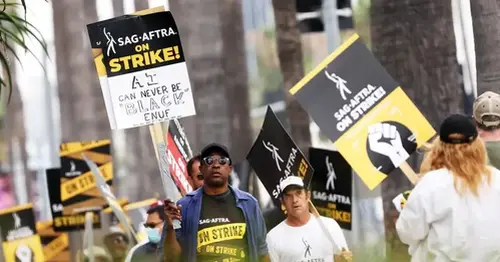
There’s still no end in sight for the Hollywood strikes
The summer movie rush is over, the fall television season is underway — and the fierce labor disputes that have upended Hollywood are dragging on with no end in sight.
Here’s where things stand.
The negotiations
The unions representing Hollywood’s striking screenwriters and actors remain miles apart from the big studios on key issues, meaning that the majority of entertainment productions are still on hold and most rank-and-file members remain out of work. The battle pits the two unions — the Writers Guild of America and the actors guild, SAG-AFTRA — against the Alliance of Motion Picture and Television Producers, a trade group that bargains for the major studios and streaming services. (The group represents NBCUniversal, the parent company of NBC News.)
The two sides are not meeting regularly, according to sources. SAG-AFTRA has not heard from the AMPTP since the union’s members announced on July 13, nearly two months ago, that they were going on strike, according to a source with knowledge of the situation. (The AMPTP was asked for confirmation, and the group has not provided comment.) The union last week re-elected its president, Fran Drescher, who has publicly railed against what she describes as corporate greed in the streaming era.
In an interview with the “TODAY” show in August, Drescher said she had no idea when the fight would be resolved, but added that her leadership team and members were ready to hunker down. “I don’t have a crystal ball,” she said. “We have financially prepared ourselves for the next six months, and we’re really in it to win it.”
The WGA and the AMPTP have not made much progress, either. The two sides remain deeply divided on issues at the center of the strike, according to a source close to the studios, including writers’ demands for stricter protections against artificial intelligence and larger royalties for their work, known in the industry as residuals. The writers are also rallying for raised base compensation and improved working conditions.
In a message to members Friday, the WGA’s negotiating committee claimed that the AMPTP “has only offered one proposal to the WGA” in the time since the writers went on strike. “Since then,” the union added, “the companies have not moved off that proposal even though the WGA in turn presented our own counterproposal to the AMPTP on August 15th.”
In the same statement, the WGA suggested that a “studio or two or three” might broker a deal with the unions independent of the other media companies, as a means to “either assert their own self-interest inside the AMPTP, or to break away from the broken AMPTP model.”
The AMPTP pushed back against that statement, saying in part: “AMPTP member companies are aligned and are negotiating together to reach a resolution. Any suggestion to the contrary is false.” The trade group has also sought to address WGA concerns about the use of AI, saying in part that it has proposed “clear guarantees that the use of AI will not affect writers’ pay, credit or separated rights.”
The WGA and SAG-AFTRA did not immediately respond to a request for comment.
The economic toll
The strikes have put many rank-and-file members in precarious financial situations. In interviews, WGA and SAG-AFTRA members have described their anxiety about cash savings running out and career prospects running dry, with some saying they have been scrambling to pick up temporary gigs for the duration of the work stoppages.
“There has been serious damage to individual guild members,” said a source who has worked with both the AMPTP and guild members over the years. “If this keeps going too much longer, it’s going to be significantly problematic to produce content by the middle of next year.”
The labor stoppages have brought the entertainment industry to a virtual standstill. Production on high-profile movies such as “Gladiator 2” and “Mission: Impossible — Dead Reckoning Part Two” is indefinitely paused. New seasons of popular TV series like “Stranger Things” and “Yellowstone” are delayed, too. Everyday viewers can already feel the effects of the shutdowns: Late-night talk shows have been dark for months, and broadcast networks are leaning heavily on reality programs that typically don’t rely on WGA writers or SAG-AFTRA actors.
However, certain independent films have received waivers from the guilds to continue shooting — and on Sunday, Drew Barrymore announced that her eponymous talk show would proceed with its fourth season despite the strikes. “I own this choice,” Barrymore said in a statement posted on social media. “We are in compliance with not discussing or promoting film and television that is struck of any kind.”
Source: https://www.nbcnews.com/pop-culture/pop-culture-news/still-no-end-sight-hollywood-strikes-rcna104179






